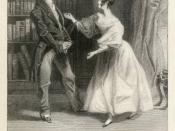Arguably one of the greatest novelists of the nineteenth and twentieth centuries, Jane Austen has proven herself through her definitive grasp of the English language to have a heightened sensitivity to universal patterns of human behavior. For a woman who had written three novels by her twenty-third year, she was quite accomplished in a world that existed on paper. Austen's style is a unique blend of wit and detail, which tends to portray the quiet, day-to-day life of the upper-middle class in the nineteenth century, the focus of this style being to combine romantic comedy with social satire and psychological insight. Because Austen's style is so distinctly embracing a period of human values and moral idealistics, one may find common themes recurring throughout her novels. In four particular novels: Emma, Sense and Sensibility, Persuasion, and Pride and Prejudice, the reader may experience similar themes revolving around somewhat formulaic plots, the two most important and prolific of these being the loss of illusions - usually leading characters to a more mature outlook - and the clash between traditional moral ideals and the everyday demands of life.
In the novel Emma, Austen guides the reader from the conformity of thought of the novel's heroine, to a more logical existence wherein Emma herself is released from self-deception (the subject of the novel) by the aptly named Mr. Knightly. Emma, a self-infatuated meddler, soon realizes her gross ignorance as Mr. Knightly's words and example become an idealistic haven from her past misjudgments. This novel shares the common theme of the "loss of illusions," as Emma slowly progresses from a state of ignorance to a state of reason and humility. Traditional moral ideals may be identified as the freedom of thought, whereas Emma stifles all thoughts and ideals in her negligence to the concerns of...



Well Done!!
Well done... I feel it would have been a bit better if you had used direct quotes to prove things from the novels... but you really helped me out!
1 out of 1 people found this comment useful.